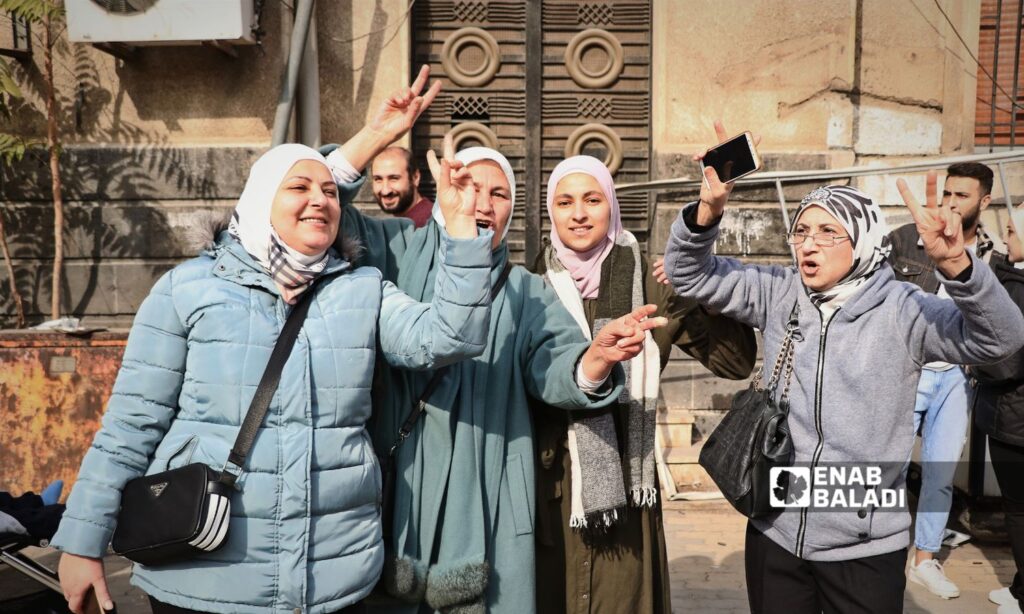Enab Baladi – Nouran al-Samman
The chaos that occurred in the early hours following the fall of the Assad regime in Damascus hides deeper dimensions revealed by the video recordings concerning the fate of civil documents that represent the legal and administrative foundation for organizing the lives of Syrians in the future.
Coinciding with the fall of the regime, government institutions, including the Immigration and Passport Department and the Central Bank of Syria (CBS), sustained significant damage, including fires and vandalism, which raised a wave of questions about the fate of civil and property records that Syrians rely on to prove their identity and legal rights.
This comes amid increasing concerns about the long-term repercussions of these losses, especially in a country that already faces enormous challenges in restoring stability.
While the acting authorities of the Syrian transitional government try to handle this catastrophe, questions arise about the extent to which institutions are prepared to preserve these documents and the means to recover them.
Will the documents be lost?
The vandalism did not stop at administrative buildings; it also affected prominent security headquarters in the capital, prompting the responsible authorities to impose a curfew and issue strict instructions aimed at protecting public properties and ensuring the safety of citizens.
Mohammad al-Abdallah, the director of the Syria Justice and Accountability Center (SJAC), told Enab Baladi that the fire in the Immigration and Passport building is “regrettable,” noting that the loss of documents could cause significant harm to Syrian citizens who already face difficulties in travel and obtaining documents and visas.
He explained that the negative impact of document destruction extends over the “long term,” leading to the loss of some individuals’ rights in ownership and legal identity.
Professor at the Faculty of Law at the University of Damascus, Hassan al-Bahri, said to Enab Baladi that the data of civil documents “have not been lost,” pointing out that backup servers have contributed to protecting essential information, according to what an officer in the Immigration and Passport Department told al-Bahri.
For his part, lawyer Aref al-Shaal, residing in Damascus, clarified that civil documents, including the property registry, are “preserved electronically” and were not harmed by recent events, noting that the damage was limited to some police centers and security agencies.
Al-Shaal added that the documents are issued through the “one-window” system, which ensures the existence of backup copies to protect citizens’ rights, reaffirming that the Civil Status Law and the Penal Code provide legal guarantees to protect records and prevent forgery or violations.
Al-Abdallah emphasized the need for the incoming authorities to take decisive steps to reorganize and issue civil documents systematically, stressing the importance of cooperation with the administrative team from the previous government to ensure access to preserved data.
Al-Abdallah confirmed that civil society and international organizations could play a significant role in protecting documents by providing “technical support.”
He also stressed the necessity of having a central authority responsible for managing documents and ensuring citizens’ rights, pointing out that these steps are essential in the recovery and reconstruction phase.
Stability gradually returns
On December 9, just one day after the fall of the previous Syrian regime, procedures began for government institutions to resume work. Qais Ramadan, a member of the executive office in the Damascus governorate, stated that some service directors returned to their jobs in the governorate to follow up on various issues of concern to citizens.
Ramadan mentioned that there is a special priority for securing diesel fuel for public transport, including internal transportation, to resume their work and ensure the transport of employees back to their jobs.
He noted that there is direct coordination with those responsible for electricity in Damascus to restore power to some areas experiencing significant outages.
The Ministry of Public Works and Housing called on its employees to return to work in all directorates, companies, and institutions and to maintain facilities and equipment.
Additionally, the president of the University of Damascus, Muhammad Osama al-Jabban, called on all deans, professors, employees, and students to head to the university premises to “protect it from vandals and thieves.”
The Military Operations Administration announced strict instructions prohibiting approaching public institutions or firing in the air to ensure the safety of properties and citizens, following the control of Damascus.
Despite the official attempts to regain control by launching campaigns to recover lost weapons and restore security, the repercussions of chaos continue to pose challenges to the capital, amid ongoing crises of fuel, transportation, and electricity.
As opposition factions entered Damascus, the commander of the Military Operations Administration, Ahmed al-Sharaa (Abu Mohammad al-Jolani), called on opposition factions to protect public properties and preserve them, as they belong to the Syrian people, in what he described as “completing the painting of victory for the greatest revolution known in modern history.”

